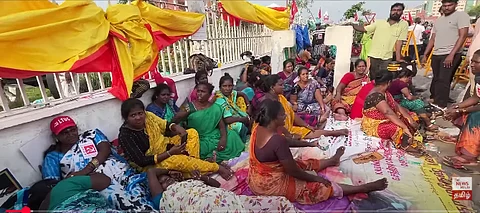

Follow TNM’s WhatsApp channel for news updates and story links.
For the sixth consecutive day, hundreds of sanitation workers employed under the National Urban Livelihoods Mission (NULM) protested in front of the Ripon Building, the headquarters of the Greater Chennai Corporation (GCC), demanding a reversal of the civic body’s decision to privatise solid waste management in zones 5 and 6. The workers argue that the move threatens their livelihoods, reduces job security, and increases the risk of exploitation.
The GCC has announced plans to outsource solid waste management in Royapuram (Zone 5) and Thiru Vi Ka Nagar (Zone 6) to private agencies starting August 1. These are among the few remaining zones yet to be privatised; 10 out of the city’s 15 zones are already managed by private firms such as Spain-based Urbaser-Sumeet and Andhra Pradesh-based Ramky Enviro Engineers Ltd (REEL).
The protest began after GCC officials informed NULM-affiliated workers on Wednesday, July 31, that they would now have to coordinate with private agencies. Additionally, workers in the morning shift who reported for duty on Thursday, August 1, were turned away.
Since then, many of the workers, some with over a decade of service, have stopped working and taken to the streets. Garbage collection in the affected areas has been disrupted, with workers from neighbouring zones temporarily deployed to manage the crisis.
The protest is being led by several trade unions, including the All India Central Council of Trade Unions (AICCTU), Left Trade Union Congress (LTUC), Labour Progressive Union (LPU), and Uzhayipor Urimai Iyakkam (Workers’ Rights Movement).
“Earlier, the demand was to regularise the workers' jobs and ensure equal pay for equal services. Now, workers are just pleading to stop privatisation,” said Sarath from Vysai Thozhargal, an NGO based in north Chennai’s Vyasarpadi. “Workers have given up asking for good things. Now they are just asking for bad things not to happen,” he said.
Under the NULM scheme, sanitation workers earn about Rs 23,000 per month. Under private contractors, they say this may drop to Rs 15,000. While private sector workers are entitled to Provident Fund (PF) and Employees' State Insurance (ESI), protesters argue that take-home pay is significantly lower, making it hard to cover basic living costs.
A large number of the protesting workers are women, many of them the sole earners in their households. They say they lack access to basic facilities such as toilets, changing rooms, paid leave, and protective equipment like gloves and masks, even during emergencies.
“We’re not asking for luxury. Rs 23,000 wasn’t enough, how are we expected to survive on Rs 15,000?” asked Dilshad, a single mother who has worked on contract as a sanitation worker for 12 years.
“There’s rent, food, school fees. We worked when VVIPs came, we worked through the Vardha cyclone and COVID-19. The Chief Minister promised to regularise our jobs, but now he has left us to suffer in the scorching sun,” she said.
Another woman told TNM, “We’ve been sitting in the sun for days. Our children are starving. Is this what we get for voting this government into power? You call this ‘Singara Chennai’? We’re the ones left to rot on the streets.”
A third protester added, “Most of us are single women. Don’t put flowers on us to honour us, let the Chief Minister make our jobs permanent. Then we’ll celebrate our salaries. That’s what we need to survive.”
Of the 1,953 temporary workers affected, many belong to Scheduled Castes, particularly the Arunthathiyar and Adi Dravidar communities. These workers were frontline staff during the COVID-19 pandemic and responded to emergencies during cyclones.
It’s worth noting that in 2021, when Chief Minister MK Stalin was Leader of the Opposition, he criticised the then All India Anna Dravida Munnetra Kazhagam (AIADMK) government’s push for privatisation and promised to regularise sanitation jobs. Protesters now say that promise has been broken.
This is not the first time workers have opposed privatisation. In early 2023, similar protests broke out when GCC proposed extending privatisation of waste management to Royapuram, Thiru Vi Ka Nagar, Anna Nagar (Zone 8), Ambattur (Zone 7), and Tondiarpet (Zone 4).
Professor C Lakshmanan, Convenor of the Dalit Intellectual Collective, told TNM, “The government claims it lacks funds to regularise sanitation workers, but can spend crores on Formula One races.”
“If the government keeps privatising essential services, what role is left for it to play?” he asked, warning that the DMK could face political consequences over this issue.
Amid mounting criticism, Chennai Mayor R Priya told the media that discussions were ongoing with the protesting workers and urged them to return to work. “Our Chief Minister has always shown respect for sanitation workers. He has had tea with them, had lunch with them, and honoured them during his visits to the Ripon Building. No other CM has done that,” she said.
Responding to AIADMK leader D Jayakumar’s criticism, she added, “Ten zones were privatised during the AIADMK regime. Did he raise his voice then? Is privatising ten zones better than two? Is he politicising this issue?”